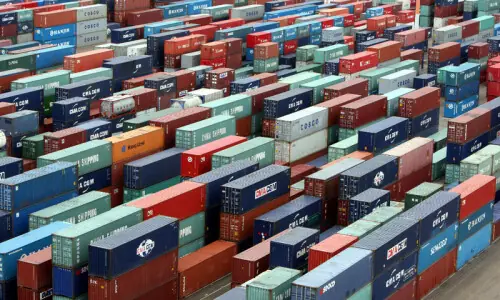THERE comes a point when reconciling with the right decision — however difficult it may seem — requires internal and external convincing. Pakistani authorities are at that moment in time. The country has been echoing with misguided trepidation around the ‘tough conditionalities’ being ‘thrust’ upon it by the International Monetary Fund. The prevailing belief is that an inflexible IMF has been demanding painful adjustments from Pakistan if it is to move ahead and complete the pending ninth review that has stalled Pakistan’s IMF-supported bailout programme.
The notion of ‘tough conditionalities’ needs a dispassionate analysis to break the impasse between Pakistan and the IMF. These conditionalities are largely short-term moves required to avoid a full-blown economic meltdown. Any mainstream economist will make similar recommendations whenever there is a balance-of-payment crisis and fiscal and quasi-fiscal bleeding of the economy.
Perhaps the most common IMF condition is believed to be the revision of energy prices. This is a misreading of the facts; the IMF does not determine energy prices for Pakistan. Energy pricing is the purview of the country’s independent regulators. For example, the Oil and Gas Regulatory Authority (Ogra) — not an external actor — determines gas prices after reviewing petitions from two state-owned enterprises: Sui Northern Gas Pipe Lines Limited and Sui Southern Gas Pipe Lines limited.
Since September 2020, successive governments have taken a conscious decision to delay the pass-through of price determinations made by Ogra. These were populist but untenable calls. The freezing of these prices has been a key contributor to the accumulation of nearly Rs1,600 billion in the state’s quasi-fiscal liabilities.
The wise approach is to do what’s needed to get on with the programme.
The country’s recent engagement with the IMF has simply brought the need to pass on the prices determined by Ogra to the forefront. Quite frankly, Pakistan should have made the decision much earlier and on its own. The same principle applies to the power sector’s quarterly and annual tariff adjustments and the fortnightly adjustment of petroleum product prices, with Nepra and Ogra determining the prices in each case.
Fiscal consolidation measures are most critical at this juncture. Tax authorities are expected to devise additional measures, even during a fiscal year, to ensure the achievement of annual budgetary targets. But, again, this is something we should be doing on our own, without needing IMF to nudge us in this regard.
Let’s turn to the other presumption: that short-term adjustments advocated by IMF are ‘tough’ decisions. This requires a serious analytical assessment. Pricing changes in the energy sector, tinkering with levies on imports and abnormal profits, imposition of sales tax, and a market-based exchange rate are medications for treating a bleeding economy. These measures can be considered politically toxic, but they are certainly not ‘tough’ to implement, even under a weak governance structure.
Global experience highlights that macroeconomic stability achieved during the life of an IMF programme is necessary but not sufficient to ensure long-run growth. That requires addressing more fundamental issues, which an IMF-supported facility may not necessarily address. The wise approach is to make the needed calls to get on with the bailout programme, improve dollar liquidity and restart the economy; then use the short-term stability thus achieved to implement the actual ‘tough’ structural reforms.
The country is yearning for radical social, economic and institutional transformation. Issues like population control, the energy sector’s overhaul, agriculture productivity revamping, a competitive and not state-subsidised export regime, balancing of the current account, debt re-profiling, fiscal and expenditure reforms to curtail the fiscal deficit, and pushing through with divestment are the actual tough calls.
For Pakistan, the pass-through of long-due adjustments, now necessitated by the IMF, feels like shock therapy. In this framing, the IMF must convince those who matter that it is a force of good on issues which can protect the economy from further macro instability. The two sides must now agree to a credible staggering of adjustments along with adequate adjusters for flood money to forge some kind of a modus vivendi.
Delaying short-term stabilisation measures can cause more pain than the measures themselves. The longer we wait, the more abrupt they will ultimately have to be. Inaction can leave Pakistan in an uncomfortably exposed position on its dollar financing needs, weakening its ability to pay for essential imports or honourably service its debts.
The writer was part of the team that negotiated the IMF programmes of 2016 and 2019 and implemented the 2016 programme.
Published in Dawn, January 28th, 2023




























